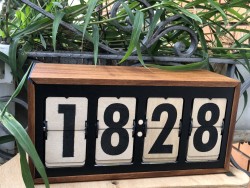I've built a Split Flap Clock, and the code has grown quite a lot, and although it does work in its current state, I am wondering if it could be cleaned up.

The whole thing runs on an ESP32 and is written in micropython.
Some information about the system:
- A digit has twelve flaps on a spool (twelve to also be able to build a calendar with 12 months).
- The spool has a magnet attached to it which a hall sensor can detect.
- The Stepper 28BYJ-48 has a total of 512 steps (unfortunately not divisible by 12).
- Upon calibration the spool rotates until the range where the magnet is active is found. The middle of that range is the calibration point.
- The calibration point plus or minus a number of steps is the zero point where the first digit (here a 0) is visible.
- After some rotations the stepper would run out of sync with the presumptive position so the
advancemethod performs an "on-the-fly-calibration" when the digit goes past the magnet position. - The digit should only move if it is calibrated.
- The digits are calibrated one after the other and as soon as a digit is calibrated it should show the correct value right away.
I chose to put all the functions related to stepper movement into the Digit class. So I can use the digit as follows:
c1 = -10 # correction steps after calibration so that the first digit is visible
s1 = Stepper(HALF_STEP, Pin(10, Pin.OUT), Pin(9, Pin.OUT), Pin(3, Pin.OUT), Pin(8, Pin.OUT), d) # initialise stepper class
h1 = Pin(18, Pin.IN) # hall sensor Pin
d1 = Digit(s1, h1, list(range(0,12)), c1, 1, label='Hour 1')
d1.show(1)
digit.py
from uln2003 import Stepper, HALF_STEP, FULL_ROTATION
import time
HALL_ACTIVE = 0
class Digit():
def __init__(self, stepper, sensor, labels = [], offset = 0, direction = 1, label =''):
self.stepper = stepper
self.sensor = sensor
self.labels = labels
self.direction = direction
self.position = -99999
self.offset = offset
self.label = label
self.magnet_range = 0
self.correction = 0
def hall_active(self):
return self.sensor() == HALL_ACTIVE
def advance_to(self, position):
position = round(position)
print(f"Advance from {self.position} to {position}")
if position > self.position:
self.advance(position - self.position)
elif position == round(self.position):
print("Already there")
else:
print(f"Advance over zero to {FULL_ROTATION - self.position + position}")
self.advance(FULL_ROTATION - self.position + position)
def show(self, label):
if label in self.labels:
i = self.labels.index(label)
self.advance_to(i * FULL_ROTATION / len(self.labels))
def advance(self, steps):
steps_left = round(steps - self.correction) % FULL_ROTATION
self.correction = 0
old = self.position
self.position += steps
if self.position < 0:
self.position += FULL_ROTATION
print(f"Added FULL_ROTATION to get to {self.position}")
if self.position >= FULL_ROTATION:
self.position -= FULL_ROTATION
print(f"Removed FULL_ROTATION to get to {self.position}")
start = -1
end = -1
while steps_left > 0:
i = steps - steps_left
self.stepper.step(1, self.direction)
if self.hall_active() and start == -1:
start = old + i
if not self.hall_active() and start != -1:
end = old + i
self.correction = round(FULL_ROTATION - (end - (end-start) / 2) - self.offset) % FULL_ROTATION
start = -1
steps_left -= 1
correction_string = f"correction of {self.correction}" if abs(self.correction) > 0 else ''
print(f"Went: {steps} steps from: {old} to: {self.position} {correction_string}")
def calibrate(self, move_to_first = False):
print(f"Calibrating the {self.label} digit")
print(f"{self.labels}")
if self.hall_active():
i = 0
while self.hall_active():
self.stepper.step(1, -self.direction)
i += 1
print(f"moved {i} out of the magnet area")
i = 0
print(f"Starting calibration")
while not self.hall_active():
self.stepper.step(1, self.direction)
i += 1
print(f"Found the magnet after {i} steps")
i = 0
while self.hall_active():
i += 1
self.stepper.step(1,self.direction)
print(f"Reached end of hall sensor at {i}")
self.magnet_range = i
# Go to the magnet center
self.stepper.step(int(i / 2), -self.direction)
print("Set the absolute zero relative to the offset")
self.position = FULL_ROTATION - self.offset
if move_to_first:
print("Go to offset")
self.advance(self.offset)
self.position = self.position % FULL_ROTATION
print(f"calibration ended at position {self.position}")
if __name__ == '__main__':
from machine import Pin
s1 = Stepper(HALF_STEP, Pin(10, Pin.OUT), Pin(9, Pin.OUT), Pin(3, Pin.OUT), Pin(8, Pin.OUT), 0.001)
d1 = Digit(s1, Pin(18, Pin.IN), list(range(0,12)), -10, 1, label='Weekdays')
d1.calibrate()
d1.show(0)
main.py
Using this code, I can display the current time like so:
from machine import Pin
from machine import ADC
import machine
import time
from digit import Digit
import neopixel
from uln2003 import Stepper, HALF_STEP, FULL_STEP, FULL_ROTATION, Driver, Command
from machine import Pin
d = 0.001
BLANK=11
(year,month,mday,h,m,s,weekday,yearday) = time.localtime()
c1 = -12
s1 = Stepper(HALF_STEP, Pin(10, Pin.OUT), Pin(9, Pin.OUT), Pin(3, Pin.OUT), Pin(8, Pin.OUT), d)
h1 = Pin(18, Pin.IN)
d1 = Digit(s1, h1, [0, 1, 2, 3, 4, 5, 6, 7, 8, 9, 10, 11], c1, 1, label='Weekdays')
c2 = -8
s2 = Stepper(HALF_STEP, Pin(13, Pin.OUT), Pin(14, Pin.OUT), Pin(21, Pin.OUT), Pin(11, Pin.OUT), d)
h2 = Pin(12,Pin.IN)
d2 = Digit(s2, h2, [0, 1, 2, 3, 4, 5, 6, 7, 8, 9, 10, 11], c2, 1, label='Days10')
c3 = -8
s3 = Stepper(HALF_STEP, Pin(40, Pin.OUT), Pin(39, Pin.OUT), Pin(38, Pin.OUT), Pin(6, Pin.OUT), d)
h3 = Pin(47, Pin.IN)
d3 = Digit(s3, h3, [0, 1, 2, 3, 4, 5, 6, 7, 8, 9, 10, 11], c3, 1, label='Days')
c4 = -46
s4 = Stepper(HALF_STEP, Pin(1, Pin.OUT), Pin(2, Pin.OUT), Pin(42, Pin.OUT), Pin(41, Pin.OUT), d)
h4 = Pin(48, Pin.IN)
d4 = Digit(s4, h4, [0, 1, 2, 3, 4, 5, 6, 7, 8, 9, 10, 11], c4, 1, label='Months')
def showTime():
(year,month,mday,h,m,s,weekday,yearday) = time.localtime()
hour = int(h/10)
if hour == 0:
d1.show(BLANK)
else:
d1.show(hour)
d2.show(h%10)
d3.show(int(m/10))
d4.show(m%10)
d1.calibrate(); showTime()
d2.calibrate(); showTime()
d3.calibrate(); showTime()
d4.calibrate(); showTime()
while True:
showTime()
time.sleep(10)
